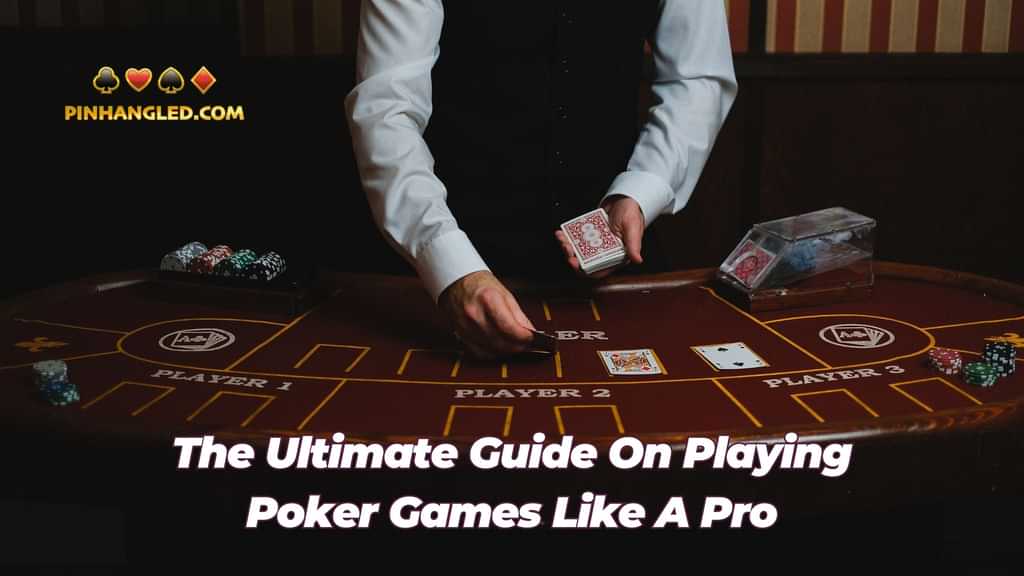The Ultimate Guide to Playing Poker Games Like a Pro

Want to master poker games and play like a pro? This easy-to-follow guide breaks down the essential rules, strategies, and techniques you need — all in clear, simple language. Whether you love online poker, live dealer casino tables, or mobile casino poker apps, you’ll find practical tips here to improve your game, avoid mistakes, and boost your casino winnings.
Table of Contents
✨ Key Takeaways
- 📚 Learn the Rules: Understand the basics of poker games, including hand rankings and betting rounds.
- 🔄 Practice Regularly: Play often to sharpen your decision-making and strategies.
- 🎭 Bluff Wisely: Master the art of bluffing without becoming predictable.
- 💰 Manage Your Bankroll: Set limits and stick to them for sustainable Internet gambling.
- 🧘 Stay Disciplined: Keep emotions in check and make logical moves.
🎮 Mastering the Fundamentals
Understanding the Basics of Poker Games
Poker is a mix of skill, strategy, and luck. The most popular version in virtual casinos and gambling sites is Texas Hold’em, where:
- 🃏 Each player gets two private cards (hole cards).
- 🏠 Five community cards are dealt face-up.
- 🏆 Players aim to make the best five-card hand.
Key actions include:
- ✅ Check (pass the action),
- 💸 Bet (add chips to the pot),
- ⬆ Raise (increase the bet), or
- ❌ Fold (give up the hand).
Essential Poker Terms
Here’s a quick glossary:
- 🎭 Bluff: Pretending to have a strong hand.
- ☎ Call: Matching the current bet.
- 🔺 Raise: Increasing the bet.
- 📊 Pot Odds: The ratio of the current pot to the cost of a call.
- 🪑 Position: Where you sit at the table — a crucial factor.
🏗 Developing Your Strategy
Identify Your Playing Style
- ⚔ Aggressive: Take control, raise often, pressure opponents.
- 🛡 Conservative: Wait for strong hands, play cautiously.
Read Your Opponents
Watch for:
- 💬 Betting patterns
- 🧍 Body language (in live dealer casino settings)
- ⏱ Timing and hesitation
Online poker players can also track opponent behavior using software tools or in-game stats.
🤔 Smart Hand Selection
Strong Starting Hands
| 💪 Strong Hands | 🚫 Avoid Hands |
|---|---|
| Pocket Aces (AA) | 7-2 offsuit |
| Pocket Kings (KK) | 9-3 offsuit |
| Ace-King suited (AKs) | Jack-4 offsuit |
Playing strong hands gives you an edge. Weak hands? Often better to fold and wait.
Position Awareness
- ⏩ Early position: Play tight (strong hands only).
- ⏳ Late position: Loosen up; you’ve seen others act.
Knowing when to fold and when to hold is part of smart casino strategies.
💳 Bankroll Management
Avoid financial disaster by:
- 📝 Setting limits before playing.
- 🚫 Never chasing losses.
- 💼 Keeping separate funds for gambling vs. personal expenses.
Proper bankroll management is key at secure online casinos and mobile casino apps.
🧠 Advanced Poker Techniques
| 🎯 Technique | Description |
|---|---|
| Bluffing | Use carefully to pressure opponents. |
| Reading the Board | Spot straights, flushes, or potential threats. |
| Adapting to Games | Adjust tactics for cash games vs. tournaments. |
| Position Play | Use late position to gather more information. |
| Bankroll Discipline | Stick to limits for long-term survival. |
Bluffing Tips
- 🤓 Bluff less against beginners.
- 🎯 Watch for “calling stations” (players who rarely fold).
- 📍 Bluff more when in late position.
🔄 Adapting to Game Types
- 💵 Cash Games: Focus on value and calculated risks.
- 🏆 Tournaments: Prioritize survival and chip accumulation.
- 🎲 Sit and Go’s: Shift to aggressive play in late stages.
- 🏟 Multi-Table Tournaments: Adjust as blinds increase.
🕶 Psychological Edge
Intimidation & Deception
Project confidence, even when unsure.
Managing Tilt
Stay calm; emotional decisions lead to poor outcomes.
Building a Poker Face
Online or live, avoid revealing patterns. Keep reactions consistent.
📈 Improving Your Poker Game
Keep a Poker Journal
Track:
- 🏅 Wins and losses
- 💡 Key hands and decisions
- ❗ Mistakes and adjustments
Review and Analyze
Look back on past games to spot:
- 🚀 Overly aggressive moves
- 🔍 Missed opportunities
- ❓ Misread opponents
Stay Updated
Follow:
- 📰 Online casino blogs
- 🎥 Live streams of poker tournaments
- 🏰 Expert casino reviews and strategies
🏁 Conclusion
Becoming a pro at poker games takes time, practice, and smart strategies. By applying the tips here, you can:
- Boost your online casino winnings,
- Compete confidently in virtual casino tournaments or mobile casino apps, and
- Enjoy the excitement of Internet gambling responsibly.
Ready to play like a pro? Keep refining your game, stay disciplined, and enjoy the thrill of online poker. 🍀 Good luck — may the cards be ever in your favor!
Would you like me to put together a printable poker cheat sheet or quick-reference guide? 🎯


Register and Get Up To ₱777 Free Bonus Today!
Frequently Asked Questions
What are the basic rules of poker games?
The basic rules of poker games include hand rankings, betting rounds, and the importance of bluffing. Players aim to have the best hand or make their opponents fold by betting strategically.
How can I improve my poker games skills?
You can improve your poker skills by practicing regularly, studying the game, analyzing your play, and learning from experienced players. Utilize online resources, books, and software to enhance your understanding of poker games strategies.
What is the importance of bankroll management in poker games?
Bankroll management is crucial in poker games as it helps you stay in the game longer, reduce the risk of going broke, and handle losses more effectively. By setting limits on how much you can afford to lose, you can play with more discipline and avoid emotional decisions.
What are some common poker games mistakes to avoid?
Some common poker mistakes to avoid include playing too many hands, not paying attention to opponents’ tendencies, overvaluing weak hands, and letting emotions dictate your decisions. It’s necessary to stay focused, patient, and avoid tilt to play poker like a pro.
How can I deal with bad beats and variance in poker games?
Dealing with bad beats and variance in poker games requires mental toughness, resilience, and a long-term mindset. Remember that poker is a game of skill and luck, and short-term results do not always reflect your true abilities. Stay positive, keep improving your game, and trust the process to overcome challenging times.

YE7 Online Casino is a premier online gaming platform that offers a diverse range of casino games, including slots, table games, and live dealer options. Known for its user-friendly interface and high-quality graphics, YE7 provides an immersive gaming experience tailored to both novice and seasoned players.
The platform ensures a secure and fair gaming environment through advanced encryption technologies and regular audits. Additionally, YE7 Online Casino offers enticing bonuses and promotions, coupled with a dedicated customer support team available 24/7, making it a top choice for online gaming enthusiasts seeking excitement and reliability.
For more online casino reviews, news and more, make sure to check out pinhangled.com
Disclaimer
The online casino reviews published on this website are intended for informational and entertainment purposes only. While we strive to provide accurate, up-to-date, and unbiased content, we do not guarantee the accuracy or completeness of the information presented. Online casino offers, terms, and features may change at any time without notice, and we encourage readers to verify all details directly with the casino operator before making any decisions.
Please note that gambling involves risk and should be approached responsibly. It is your responsibility to ensure that online gambling is legal in your jurisdiction before participating. We do not promote or endorse underage or illegal gambling.
This website may receive compensation from some of the brands featured through affiliate partnerships. However, our opinions remain independent, and compensation does not influence the objectivity of our reviews.
If you or someone you know is struggling with gambling, we strongly recommend seeking help from professional resources or contacting your local responsible gambling authority.
Play responsibly. Must be 21+ or legal age in your region.
Affiliate Disclosure: Some of the links on this website are affiliate links, which means we may receive a commission or referral bonus if you click on a link and sign up or make a deposit at an online casino. This comes at no additional cost to you and helps support the maintenance and development of our site.
Our goal is to provide honest, independent, and accurate information about online casinos, games, promotions, and services. While we may be compensated through affiliate partnerships, we only recommend platforms and products we believe offer genuine value and a safe, enjoyable gambling experience.
We are committed to transparency and maintaining the trust of our readers. The presence of affiliate links does not influence our reviews, rankings, or editorial content.
Please gamble responsibly and ensure online gambling is legal in your jurisdiction before participating.
21+ only. Terms and conditions apply.
Additional Resources
Useful Links
- Expert Tips On Maximizing Casino Bonuses And Free Spins
- The Ultimate Guide On Playing Poker Games Like A Pro
- How To Win Big At Online Casinos – Top Strategies For Success
- How To Beat The Odds – Mastering Blackjack And Roulette
- Step-by-Step Guide To Winning Real Money At Online Slot Machines
- Mastering Progressive Jackpots – Tips And Tricks For Huge Wins
- How To Dominate Online Tournaments And Compete At The Highest Level
- Ultimate Guide To Winning Big In Sports Betting And Live Casino Games
- The Best Betting Strategies For Success In Online Gambling
You may also like:
About the Author
Althea Fernandez is a passionate content writer and strategist who creates engaging articles tailored for both seasoned and new players in the online gaming world. With a sharp focus on the blend of technology and gaming, she crafts content that informs, guides, and builds meaningful connections between brands and their audiences. Althea believes that “Content is the gateway to customer experience, and strategy is the path that leads them there,” making her work both impactful and player-focused.